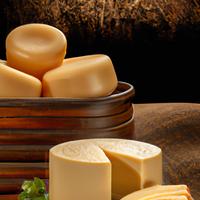
1 serving (30 grams) contains 121 calories, 7.5 grams of protein, 9.9 grams of fat, and 0.4 grams of carbohydrates.

Log this food in SnapCalorie

Nutrition Information
Calories |
964.8 | ||
|---|---|---|---|
% Daily Value* |
|||
| Total Fat | 79.4 g | 101% | |
| Saturated Fat | 45.4 g | 227% | |
| Polyunsaturated Fat | 0 g | ||
| Cholesterol | 252 mg | 84% | |
| Sodium | 1490.4 mg | 64% | |
| Total Carbohydrates | 3.1 g | 1% | |
| Dietary Fiber | 0 g | 0% | |
| Sugars | 1.2 g | ||
| protein | 59.8 g | 119% | |
| Vitamin D | 57.6 mcg | 288% | |
| Calcium | 1730.4 mg | 133% | |
| Iron | 1.7 mg | 9% | |
| Potassium | 235.2 mg | 5% | |
* Percent Daily Values are based on a 2,000 calorie diet. Your daily values may be higher or lower depending on your calorie needs.
Food Attributes
Source of Calories
About Queijo amarelo
Queijo Amarelo, translating to "yellow cheese" in Portuguese, is a popular cheese variety widely consumed in Brazil and Portuguese-speaking countries. Its vibrant yellow hue typically comes from natural annatto coloring or the aging process, depending on the type. This semi-hard cheese is often made from cow's milk and boasts a creamy, slightly tangy flavor that pairs well with breads, sandwiches, and traditional dishes. Queijo Amarelo is rich in protein and calcium, supporting muscle function and bone health. However, it is also high in saturated fats and sodium, which should be enjoyed in moderation, particularly for those managing heart health or blood pressure. As a versatile element of Brazilian cuisine, it adds indulgence to savory snacks and casseroles, but balanced consumption is key for maintaining a healthy diet.



